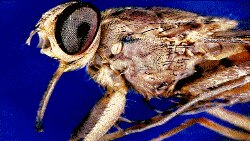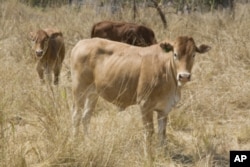A team of scientists have made a revolutionary breakthrough on a parasite carried by the tsetse fly. The researchers say it may prove to be vitally important to the lives and livelihoods of millions of African farmers.
The parasite known as trypanosome causes both African sleeping sickness in people and a wasting disease in cattle.
Scientists at the International Livestock Research Institute in Nairobi, Kenya have been working on the cattle equivalent of the disease trypanosomiasis.
Steve Kemp is senior author of the study and told VOA what they found.
“We’ve been working on the cattle equivalent of the disease and found one of the interesting features of the disease is that some breeds of cattle are extremely resistant to the affects of Trypanosomiasis. They have trypanosome swimming around in their bloodstream, but, they remain perfectly healthy and productive. Whereas most cattle die very quickly following the infection."
Kemp says the research was aimed at understanding how resistant animals resist the affects of the pathogen. They identified two genes that play an important role in this and are involved in the innate immune response, which is a significant find.
“It is important because it provids a way of selective guiding and breeding for resistance to trypanosomiasis.
There are still a number of pieces that need to be fitted together in that jigsaw before it is a direct help to farmers in Africa,” said Kemp, but it highlighted, “what this has allowed us to do is ask some basic questions about how the immune response works.
That has a payoff in understanding human diseases and other animal diseases.”
Kemp explained that the trypanosome parasite is transmitted by the tsetse fly.
“The tsetse fly bites the cattle and injects the parasite into the bloodstream. It causes severe anemia and severe weight loss in most animals. Susceptible animals will typically die in a few weeks of infection. Other animals are able to remain fit and healthy despite the presence of trypanosomiasis.
Livestock are vitally important to the agriculture system throughout all of Africa. Kemp says it is not just a question of meat production or milk production. “Livestock are involved in crop production in that they pull plows. They deliver goods to market. They provide manure. They provide a banking system. They provide a resource that can be sold and called upon in times of need,” explained Kemp.
What trypanosomiasis does is remove that whole vital slice from agricultural systems.





